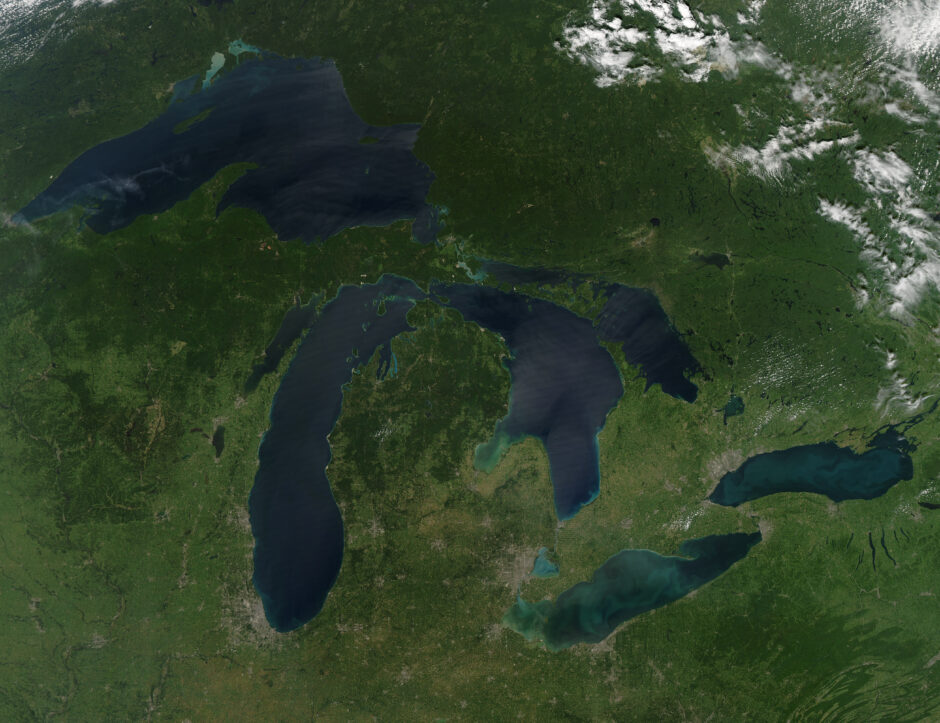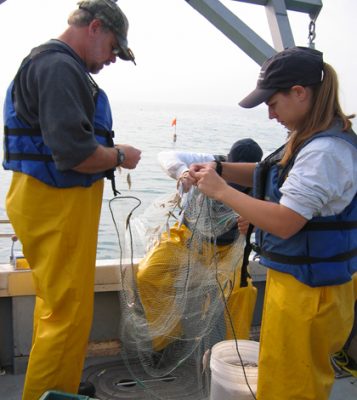Using Models to Prepare the Great Lakes Fishery for Climate Change
 NASA image acquired August 28, 2010 of the Great Lakes. (Credit: NASA Goddard Photo and Video via Flickr CC BY 2.0))
NASA image acquired August 28, 2010 of the Great Lakes. (Credit: NASA Goddard Photo and Video via Flickr CC BY 2.0))Like other lake regions across the world, the Laurentian Great Lakes are facing changes as a result of climate change. In particular, the Great Lakes Fishery has been hit hard—impacting habitat suitability, fish health, water temperature, seasonal dynamics and other system components.
While there is a long list of studies conducted in the fishery, there is limited understanding of how exactly climate change will impact the fishery. Modeling and continuous monitoring efforts can help develop a better understanding of conditions and support future predictions.
Applying Models to Management Strategies in the Great Lakes Fishery
In limnology, modeling has grown in popularity as a means of monitoring and predicting conditions in the future under various climate scenarios. Researchers with Purdue University and Illinois-Indiana Sea Grant, who are leading modeling efforts in the Great Lakes Fishery, are focused on including policymakers in their work in order to ensure that the models are actually implemented.
The idea is that the modelers can focus their work to meet those needs, “versus just sitting in the ivory tower producing science that nobody ever wants to actually see or use,” said Linda Prokopy, associate professor of natural resource social science at Purdue.
Participation and quality of responses in the surveys conducted by researchers was high, according to Prokopy, indicating that fishery managers are interested in how climate change is going to impact the resource.
The survey asked policymakers to identify some key concerns for the region—most tended to list invasive species and habitat loss as greater long-term threats to the fishery’s stability than climate change. However, climate change and many of these issues go hand in hand. For example, climate change has the potential to exacerbate invasive species issues by making the water hospitable to non-native species.
Another feeling shared was that they believed the data needed already exists—they’re just not sure where to find it. However, Prokopy warns that the full impacts of climate change are unknown, though there is research that could help support some predictions and mitigation strategies. While this research exists, some of it is buried in journals, unavailable to the public, or exclusively held by outside agencies.

Great Lakes fishery scientists gillnetting on Lake Huron (Credit: R. Redman, LMBS)
Why the Great Lakes Fishery Should Prepare for Future Climate Change
The surveys revealed that a majority of managers were most concerned about how climate change might affect commercially and recreationally valuable species like lake trout, walleye and yellow perch. More specifically, the water quality variables that would influence these species most: water temperature, wind intensity, water levels and precipitation.
Short-term data was a higher point of interest for individual managers, while agencies seemed more invested in long-term data. The preference for short-term data also highlighted that fisheries researchers across the Great Lakes apparently share a morbid sense of humor.
“Interestingly,” the authors wrote in the study, “in five out of six of the focus groups, at least one respondent said (half-jokingly) that later time scales were not important because, ‘We [the focus group participants] will be dead.'”
Conclusion
Ultimately, climate change has already started to change the Great Lakes in fish distribution, annual temperature trends, algal bloom frequency and many other variables associated with climate change. Whether managers are prepared or not, climate change will shape the region, and modeling may be their best chance at getting ahead of future issues.
The fishery supports a multi-billion dollar industry between the workers hired and those who rely on the fish for food security. Ignoring the future potential of climate change places the industry and everyone who relies on the Great Lakes Fishery in danger of a less secure future.



0 comments